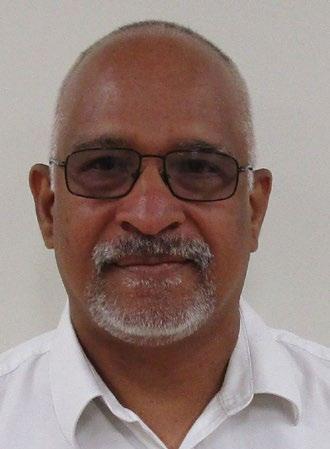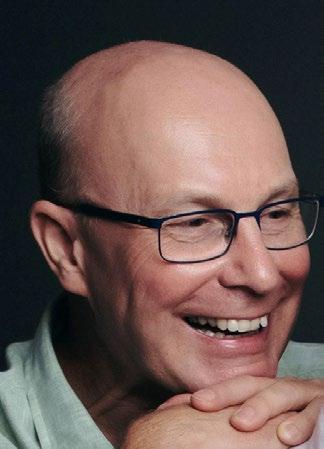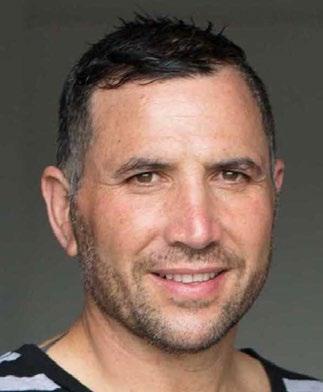
13 minute read
It’s a great life out there!
Surgeons share their experiences working in rural and regional areas of Australia and New Zealand
Mr Sabu Thomas, General Surgery, Kalgoorlie, Western Australia
Advertisement
I have always had wonderful and very collegiate general and subspecialty colleagues in the regional areas where I worked. In rural practice you have a close relationship with colleagues, including surgeons, anaesthetists, staff in clinics and theatre.
Urban surgeons and specialty boards need to value rural surgery and rural surgeons. Don’t devalue their work – indirectly, or directly. Support rural surgeons by visiting them, and credential them to visit and work in needed subspecialty areas in big tertiary centres once in a while.
Rural surgeons need to be encouraged to do procedures that can be safely done in regional hospitals, rather than always sending patients to larger hospitals. Sending patients away does not build regional surgical capacity, nor attract a capable workforce to regional areas.
If you are a surgeon in a regional area, keep learning new procedures relevant to your practice. Travel nationally or internationally, if possible, and keep using your learning and skills to assist in different parts of the world. Think of surgery in terms of a vocation and calling.
Associate Professor Matthias Wichmann, General Surgery, Mount Gambier, South Australia

When we came to Australia from Munich we had to work in an ‘area of need’. We chose Mount Gambier because it was halfway between Melbourne and Adelaide, had good schools for our children, and the hospital was closely connected with two universities.
Working in a rural environment always keeps you on the tips of your toes. Even after 15 years of working in rural surgery, you need to come up with new ideas or find a friend to talk to about how best to approach a certain condition. In Mount Gambier I have always been lucky to have colleagues to work with and to rely on. This has made my life as a rural surgeon much easier and much less stressful.
Rural surgery is probably the only specialty where a surgeon can do an endoscopy and a hernia repair followed by a gallbladder and a bowel resection – all on patients they have met before surgery, will meet again after surgery and will most likely bump into at a friend’s place not long after that. We get to care for our cancer patients throughout their cancer journey and I would not want it any other way.
Every Australasian surgeon should be exposed to rural surgery for at least six months of their training. I would be surprised if we do not see more young surgeons developing an interest in this fascinating specialty. Life in rural communities is very rewarding and welcoming. My advice would be, try it and keep an open mind about a nonmetropolitan career. It’s a great life out here!
Dr Roxanne Wu, Vascular Surgery, Cairns, Queensland

Living and working in a regional area has given me a balanced life and a richly rewarding career. I have brought subspecialty skills in Vascular Surgery to a region that did not know they needed a vascular surgeon. When I came to Cairns it became evident there was a huge need for dialysis and its attendant vascular problems; a need for a vascular surgeon to attend to the diabetic foot problems and of course the usual peripheral vascular disease and trauma.
It takes me 15 minutes to drive to the hospital, except for the days I do a rural outreach clinic which is usually an hour’s drive away. Running a practice in a regional centre is easy. I have never had to look for work, it comes to find me. Most of the general practitioners know you personally and it is easy to get to know them. There is absolutely no shortage of work, rent is reasonable, and getting good employees who stay for years is not a problem.
One of the best things is the ability to work in a community: patients and their families stay close and now that I have been practising here for over 30 years, I have had the privilege of operating on multiple generations of the same families. I have one of the best followed up cohort of EVAR (EndoVascular Aneurysm Repair) patients in the country. It is really special to follow up patients for decades and be able to really know what one’s outcomes are for the procedures that you do.
Dr Shehnarz Salindera, General Surgery, Woolgoolga, New South Wales

I grew up in a rural area and studied medicine with the goal of one day practicing in my hometown. As I progressed through training, I requested rural rotations where I was able to meet wonderful mentors, such as Dr Sally Butchers in Lismore and Dr AJ Collins in Bega, who encouraged me and supported me through training. They showed me that you can be a generalist and practice subspecialty surgery in a rural setting.
Working in a rural setting has ensured I maintain my skills in General Surgery and further developed my leadership and management skills. In a smaller hospital you will be asked to step up and lead hospital committees, help establish clinical services or assist with managing the trainees or rosters.
I have been able to establish my practice relatively quickly and use all of the skills from my training immediately. I also had the opportunity to establish a breast reconstruction service from the ground up and design the model of care in line with best practice, instead of having to fit into an existing structure or way of doing things, which has been very exciting.
Don’t be afraid to ask for the working conditions and flexibility you need to make the move to rural. Consider how you will maintain your collegiate networks and support structures once you make the move.
Specialty boards can help by developing more rural training positions at all stages in the training pipeline, including Fellowship posts. Having the opportunity to train rurally at any point in your pathway will help more Trainees explore the wonderful opportunities available in rural settings.
Dr Lincoln Nicholls, Orthopaedic Surgery, Whangārei, New Zealand

I’m currently a Māori SET 3 Orthopaedic Trainee working at Whangārei Hospital in New Zealand’s most Northern District Health Board.
My wife is a Māori pharmacist and health research fellow and together we are proud and dedicated Māori health practitioners from small town Aotearoa New Zealand. We believe we are charged with the responsibility to work extremely hard and strive to improve outcomes for Māori as well as all patients under our care. This is a responsibility we are honoured to uphold. We believe that our clinical skills, soft skills, life experiences, our cultural expertise and command of Te Reo and Tikanga Māori can help achieve this.
Being from small towns in New Zealand, we feel we have a responsibility to return to the regions after completing our training to work amongst regional and rural communities where our people are. As Māori there is a very strong internal drive to do this.
My training career thus far has seen me working in four regional hospitals and one tertiary hospital. Next year, for my final two years in training, I will be placed in a tertiary hospital, which is probably a necessity. However, on completion of training, my whānau and I would very much love to move to a region with high Māori need. Te Tai Tokerau, Rotorua, Waikato, Te Tairawhiti, Manawatu, and Whanganui are all regions we have iwi (tribal) connections to and regions where our people would like us to be. We look forward to opportunities that may arise from such communities.
A Māori whakatauki (proverb) explains the importance of training and remaining or returning home to their people. ‘Tangata i akona ki te kāinga, tūngia ki te marae, tau ana. A person trained at home will stand on the marae with dignity.’
Mr Philip Gan, General Surgery, Warrnambool, Victoria

When I set up a practice in Warrnambool 19 years ago I wanted to maintain a broad skill-set and varied practice, but also to have a greater relative freedom to follow my areas of interest, to avoid the battle of Melbourne traffic, and to be close to the ocean, which I have always loved.
My first ‘bosses’ as an accredited registrar were Mr Rodney Mitchell and Mr John Daniels in Bendigo, who inspired me to high levels of surgical care in a regional setting. I could see that skills and standards are something you develop and bring with you, wherever you practise. Importantly, my wife, who is a general practitioner, spent many of her formative years growing up on the Gold Coast and was very comfortable moving to another coastal region. We did investigate the local schools and were satisfied that we could provide our two children with a great education without resorting to boarding schools.
When I started, there were only three general surgeons in Warrnambool, with far fewer sub-specialties available locally. I was therefore doing superficial parotidectomies, thyroidectomies, fundoplications, Dupuytren’s contractures, digital nerve and extensor tendon repairs, finger fractures, all manner of flaps and grafts, breast surgery, as well as a broad range of colorectal surgery on top of the usual gamut of cholecystectomies and hernia repairs.
As subspecialists started to set-up in Warrnambool, I progressively divested those areas of my practise, which allowed me to further focus on my particular passion of minimally invasive surgery. I have incorporated single and reducedport, mini-laparoscopic and even hybrid trans-vaginal NOTES techniques across a very broad range of operations. My series of laparoscopic colorectal resections was the first to be presented from any Australian regional centre (RACS Annual Scientific Congress, Hong Kong 2008), and have evolved to intra-corporeal anastomoses. These patients go home as early as day one or two post op without opioids. My cholecystectomies are typically day procedures, also generally without requiring discharge opioid analgesia.
I became involved in medical device innovation and have three patents to my name, covering two medical devices, one of which (the LiVac Retractor) is already in market. I felt very supported during the journey of taking this from concept to registered medical device, particularly in conducting a First in Human Clinical Trial to International Standard ISO 14155 (2011). This was the first and only time that St John of God Australia and South West Healthcare Warrnambool had approved a First in Human medical device trial.
I don’t know that I could have developed and maintained the same breadth of practice that I enjoy now in an urban setting. Being in a rural setting has not prevented me from advancing my surgical interests and skills.
Dr Sally Butchers, General Surgery, Lismore, New South Wales

Rural surgery has given me the opportunity to maintain an interesting and broad general surgical practice. I have not had to subspecialise, and I enjoy the wide variety of work that I am able to do. I also feel that the opportunity to be involved in the local community has provided me with a good work-life balance.
I live on a property that is 15 minutes from work with no traffic, and I do feel that the lack of commute has played an important part of being able to get the balance right! I was honoured to convene the 2015 Provincial Surgeons of Australia Annual Scientific Conference (PSA ASC) in Lismore, which provided a great opportunity to showcase to junior doctors, registrars, and young Fellows some of the benefits of living and working in a non-metropolitan surgical environment.
I think it is important for everyone to recognise that maintaining generalism within any specialty training program is important. It allows us to provide a level of care to the same high standards for all Australians, regardless of where they live.
We need to support Trainees who have an interest in working in rural areas, and the establishment of more rural training hubs is one way to achieve this goal. We can also continue to promote rural Fellowship positions. An example of this is the collaboration between the many specialties in setting up the Post-Fellowship Education and Training (PFET) program in Rural Surgery, commencing in 2022. This program will allow Fellows to have additional training in two subspecialty areas in metropolitan centres, and establish vital peer support networks that they can call upon when they start working in their rural positions.
Dr Mark Romero, General Surgery, Port Macquarie, New South Wales

Working in a regional area means you have to be flexible in order to provide care to the community. Although all the general surgeons here have a subspecialty interest, we all also overlap in a lot of ways. This means we can often cover for each other and also that when more specialised care is required, we can refer to or consult each other. Your area of practice is broader than in big centres but not so broad that you become a ‘jack of all trades’. It’s certainly a nice balance. We are expected to deal with all emergency general surgery when on call, which can range from simple abscesses to trauma laparotomies. Elective operating lists are varied and it’s not too uncommon to start the day with, for example, an ingrown toenail and finish with an ultra-low anterior resection.
The most surprising thing about rural surgery is the sense of community. You will fix a hernia on a patient one day and a few months later you will see them at Bunnings, or they will turn out to be your child’s soccer coach. New patients will tell you how you operated on their neighbour or that their friend recommended you. Word of mouth is incredibly powerful and, given that there are only a few of us, the need to advertise or ‘compete’ with each other is non-existent. I feel this generates a very collegiate work environment and I have always felt very supported.
The advice I would give to aspiring rural surgeons is to voice your desires as soon as you know them. If you are in a rural term and you could see yourself working there, let the local surgeons know. They will often keep you in mind and let you know if a job is coming up, whether in that institution or somewhere else. I find the lifestyle fantastic and I thoroughly recommend it.
Dr Kesley Pedler, Urology, Port Macquarie, New South Wales

I grew up in Sydney and did not consider regional practice until I was seconded on rural rotations as a surgical registrar. I particularly enjoyed working in Port Macquarie. I liked the beautiful region and the staff who worked at the hospital. I came back to Port Macquarie two years later as a Urology Trainee and was inspired by the consultants, who had established a subspecialised unit offering almost all the same procedures available in a large city hospital, including major oncology operations.
My goal is to offer patients who live in a regional and rural Australia the same quality health care as is received by patients who live in the city. It can be challenging accessing new technology, such as robotic surgery, but I am fortunate to have a very supportive colleague in Sydney who mentored me for robotic cases, first in Sydney and now locally.
If you are interested in working in a regional area I would strongly recommend working in the area beforehand if possible, either as a Trainee or a locum. There is more than just location to consider when setting up practice and this will allow you to get to know the other surgeons and staff who work in the area. I am fortunate to work with three other urologists so I have supportive colleagues locally.
I also recommend establishing good relationships with colleagues in your close major centres who will be able to give you advice for complex cases and accept referrals for patients who cannot be managed locally.






